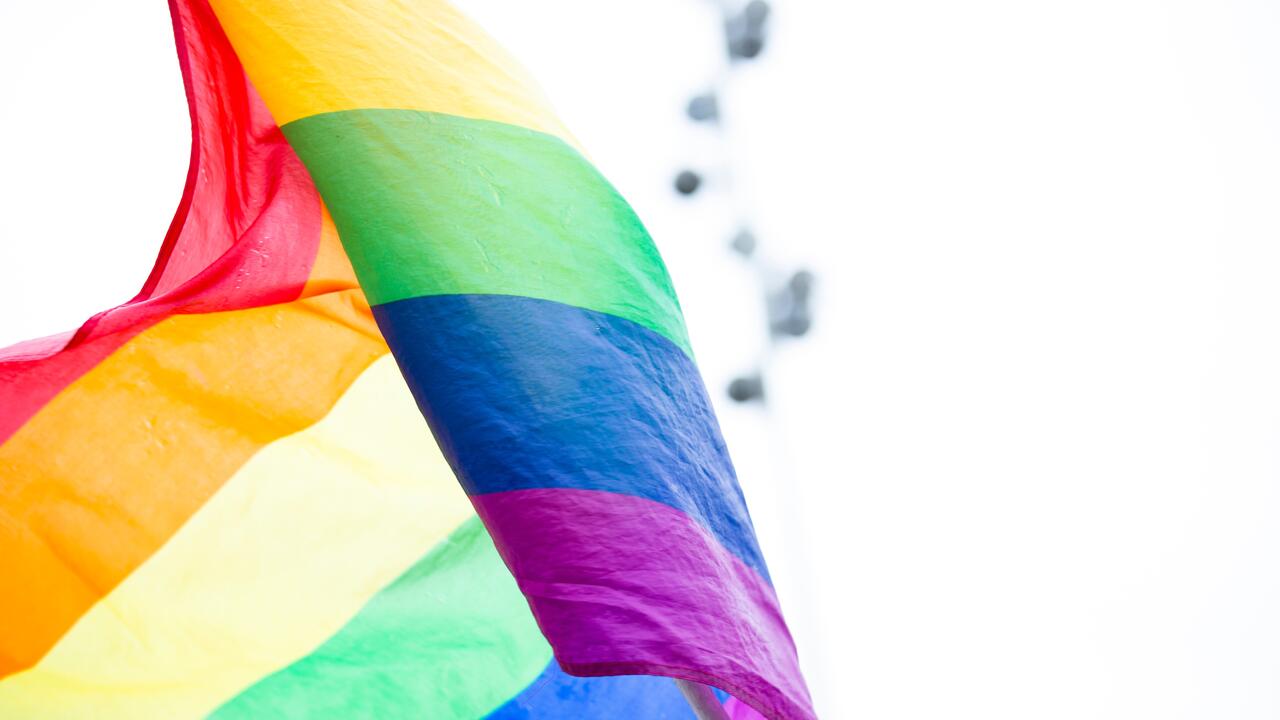
Glow turns 50
Over 50 years, the Glow Centre has made a difference to thousands of LGBTQ+ folks. Three alumni share their stories.

Over 50 years, the Glow Centre has made a difference to thousands of LGBTQ+ folks. Three alumni share their stories.
By Megan Vander Woude Office of AdvancementFor 50 years, the Glow Centre (previously GLOW, GLLOW and WUGLM) has fostered a supportive network for folks on campus and in the wider community. Throughout that time, it’s offered social events, peer support, advocacy and resources for anyone who needs it.
Speak to LGBTQ+ alumni, and you’ll discover just how meaningful Glow can be. Read on for three significant moments shared by three alumni, each one shaped by Glow.
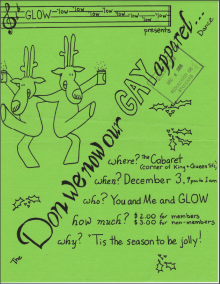
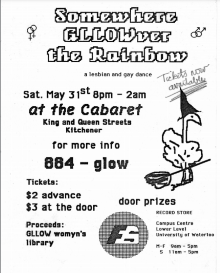
From the Grand River Rainbow Historical Project, two posters promoting dances through the 1980s. On the left: Dancing reindeer celebrate the GLOW Christmas dance in 1988. On the right: Promoting the "Somewhere GLOWver the Rainbow" dance in 1986. For more event posters and historical artifacts, visit the project archive.
Two years into his degree, Paul Barton (BSc ’82) became a steadfast member of the Glow community. He answered the phone help line, advocated for gay rights with the local municipality and wrote regular columns in Imprint and the Glow newsletter. But it all began when he attended a dance:
“The first thing I did was go to a Glow dance. Every month, they held a dance on campus… The humanities building [Hagey Hall] had a lounge and for a while the dances were there. And I actually went.
“I can remember I wore my suit jacket and everything. It was so stupid because who wears a jacket to this little hippie club thing? Anyway, it was really fun. It's funny, I still remember the people. I still can see their faces, which is pretty impressive because that was 1980—a long time ago now.
PAUL BARTON, Alumnus
…it was just such a profound experience to go to something that I had thought about my entire life. To actually go somewhere where I didn't have to guess.
“But it was just such a profound experience to go to something that I had thought about my entire life. To actually go somewhere where I didn't have to guess.
“Anyway, I went! And there was music and there was punch —you know, it was still very corny—but there was music and it was gay people and there was dancing. Actually, I think I met someone that night. For the first time in my life, I met someone, which was pretty wild.”
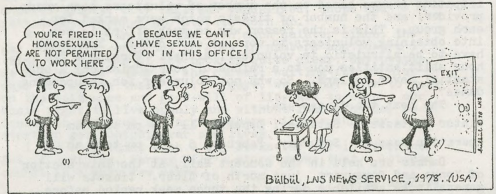 A comic from the first issue of the GLOW newsletter, published in 1982. Paul was one of the volunteers who organized the newsletter. You can still read many of the issues in the Library's digital archives.
A comic from the first issue of the GLOW newsletter, published in 1982. Paul was one of the volunteers who organized the newsletter. You can still read many of the issues in the Library's digital archives.
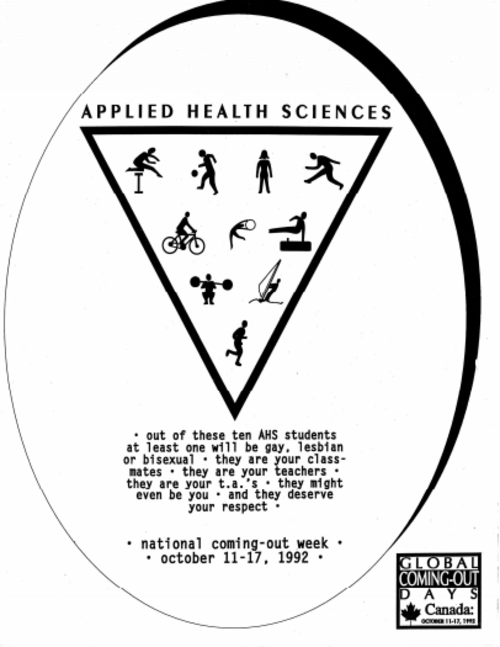
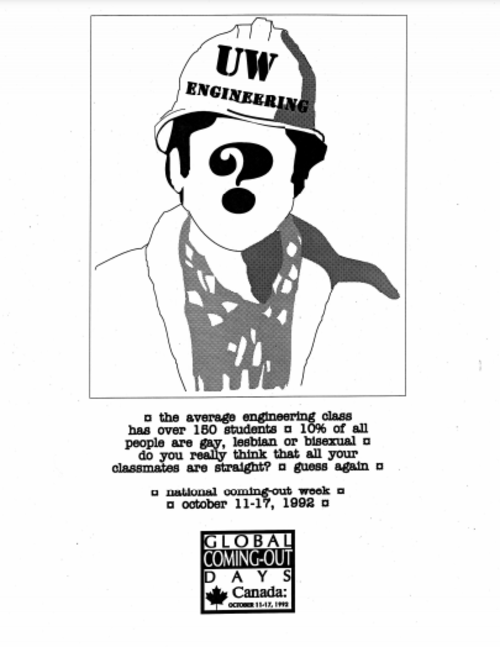
From the Grand River Rainbow Historical Project: two Faculty-specific posters created for Global Coming Out Day in 1992.
Throughout his degree, Mark Schaan (BA ’02) was very involved with the Federation of Students (also known as Feds, now WUSA), and spent a lot of time in the Student Life Centre. Eventually, he became an assistant editor of Imprint too. None of his student involvement included Glow, but he knew many of the volunteers through Imprint and student government—and one of those connections helped him come out:
“Glow played this extraordinary role in my coming out. Before university, I was a sheltered kid from a Mennonite community in Manitoba. At Waterloo, I was exposed to the world and I was kind of figuring things out.
“Through my involvement, I ended up working on an executive campaign for Feds. There was one guy on their ticket who was wildly out. He was a former coordinator of Glow, and he was deeply engaged and comfortable in his own queerness. And so one day, we’re making posters or banners for the campaign in the SLC, and I can't remember who asked the first question or whether I asked something—but I ended up in this intensive outpouring conversation. I think he might have asked something about where I was at. And suddenly, out came the floodgates.
MARK SCHAAN, Alumnus
Glow was a really important piece of my story because it opened the conversation. I was someone who had never met a proud, out, queer individual before university.
“That conversation caused this whole explosive portion of my coming out journey. I confided in folks closest to me, contemplated my relationships, and then I sat in my room at Grebel and listened to ‘That I Would Be Good’ by Alanis Morissette on repeat for two days and cried. After that, I had to go on a post-secondary education policy trip at Acadia University. So a friend and I drove out east, and I had this amazing reflective experience.
“Anyway, I ended up coming back and delayed my coming out for another year. But a year later, I really did come out—I dyed my hair platinum and was at the gay bar by the weekend. And that was the beginning.
“Glow was a really important piece of my story because it opened the conversation. I was someone who had never met a proud, out, queer individual before university. Glow created the infrastructure that allowed for this connection to happen and it ultimately drove me to find a huge chunk of myself.”
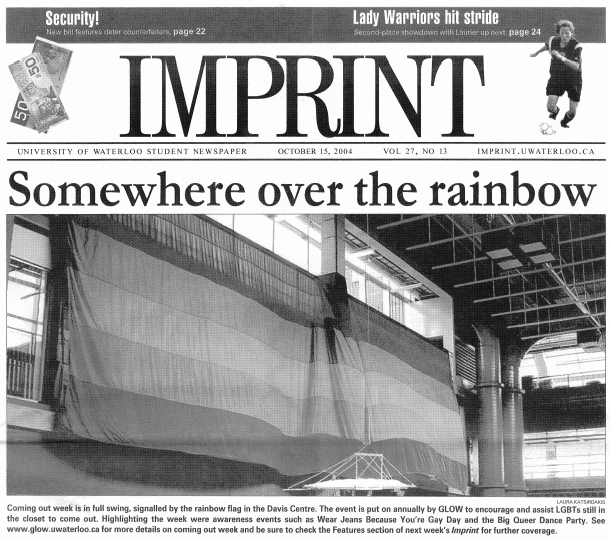 In 2004, Glow celebrated Coming Out Week by hanging a large pride flag from the third-floor railings of the Davis Centre, as shown here on the front page of that week's Imprint. The event was also celebrated with Wear Jeans Because You're Gay Day and a Big Queer Dance Party.
In 2004, Glow celebrated Coming Out Week by hanging a large pride flag from the third-floor railings of the Davis Centre, as shown here on the front page of that week's Imprint. The event was also celebrated with Wear Jeans Because You're Gay Day and a Big Queer Dance Party.
Before he came to Waterloo, Marc Hall (BA ’09) made international headlines. You might remember his story: when his high school wouldn’t allow him to bring his boyfriend to prom, Marc took them to court. When he started at Waterloo the next fall, Glow made him feel like he belonged in the campus community:
“When I got to Waterloo, just knowing that Glow was there—it was reassuring for me. Before I got to campus, I didn't know it existed, so when I saw there was an LGBTQ+ group on campus, it seemed so supportive and cool to me. I never really had those kinds of support groups in high school; we had no Gay-Straight Alliance for example. It was good to know that there was a safe space and a group of people here. For me, just having that visibility really helped. In my experience, the student body in general was really supportive and accepting. I think having resources and groups like Glow helped facilitate that.
“Also, my court case was in 2002. Before I came to Waterloo, we had just done an interlocutory injunction, basically just so my boyfriend could go to the prom. But we were promised to go to a trial later on. We were doing fundraising for that during my first couple of years at Waterloo, and Glow put on a little fundraiser for my case.
MARC HALL, Alumnus
I was very fortunate that my family and friends were supportive. But for those people who are struggling or don't feel like they have support, groups like Glow are everything.
"I think it was my first year, and Miss Drew did a drag show. It was in that little white house—the Grad House—and they raised a bit of money. It was so nice, and this was my introduction to the community. Over the next few years I went to a lot of their social events like ‘Drag me to the Bomber’ and nights at Club Ren.
"I loved attending Glow events, but I didn’t get super involved. I was very fortunate that my family and friends were supportive. But for those people who are struggling or don't feel like they have support, groups like Glow are everything. It’s where you can find all of your support and resources. You don't have to be alone; you can find people who are going through the same struggles or will have ideas on how to help.”
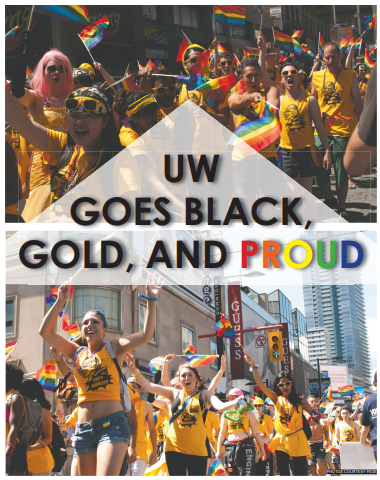
More than 130 Warriors joined together for the Toronto Pride Parade in June 2013, as shown in this Imprint clipping.
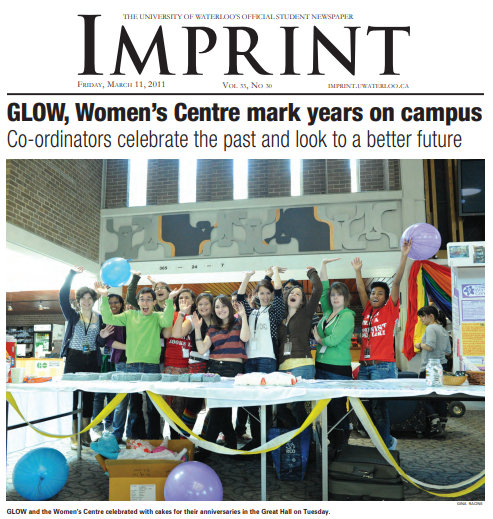 The front page of Imprint on March 11, 2011 celebrated the 40th anniversary of Glow and the 30th anniversary of the Women's Centre. Volunteers from both groups came together to celebrate in the Student Life Centre.
The front page of Imprint on March 11, 2011 celebrated the 40th anniversary of Glow and the 30th anniversary of the Women's Centre. Volunteers from both groups came together to celebrate in the Student Life Centre.
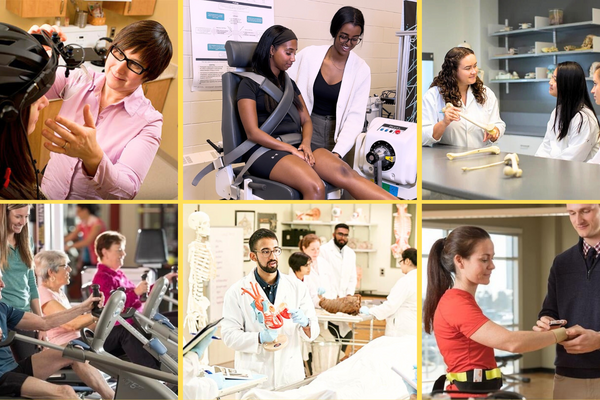
Read more
From optometry and pharmacy to public health and therapeutics, Waterloo alumni are powering Canada’s health care sector
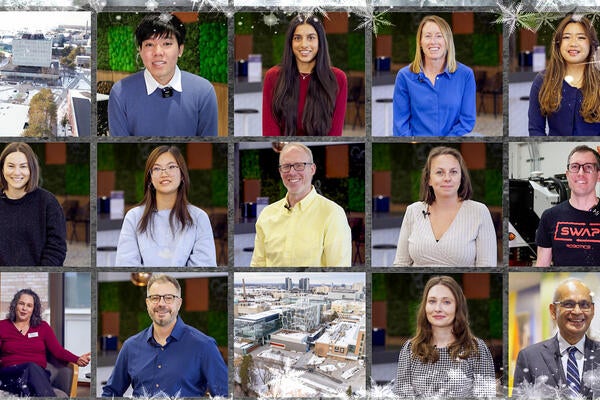
Read more
A winter holiday message from President Vivek Goel
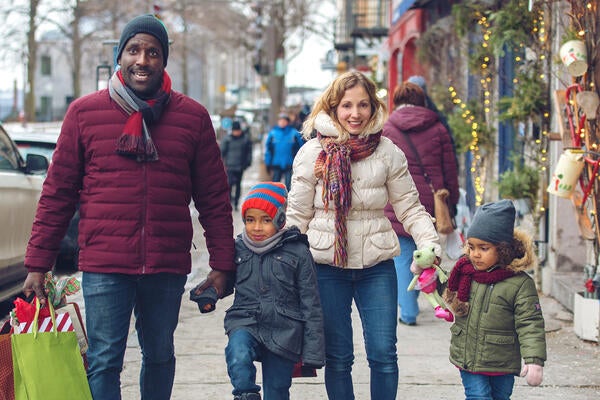
Read more
Shop Canadian this holiday season with festive porch plants, fashion-forward apparel, craft spirits and more from Waterloo entrepreneurs
The University of Waterloo acknowledges that much of our work takes place on the traditional territory of the Neutral, Anishinaabeg, and Haudenosaunee peoples. Our main campus is situated on the Haldimand Tract, the land granted to the Six Nations that includes six miles on each side of the Grand River. Our active work toward reconciliation takes place across our campuses through research, learning, teaching, and community building, and is co-ordinated within the Office of Indigenous Relations.